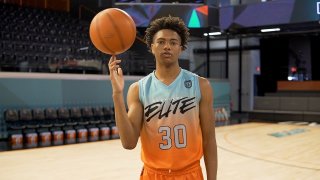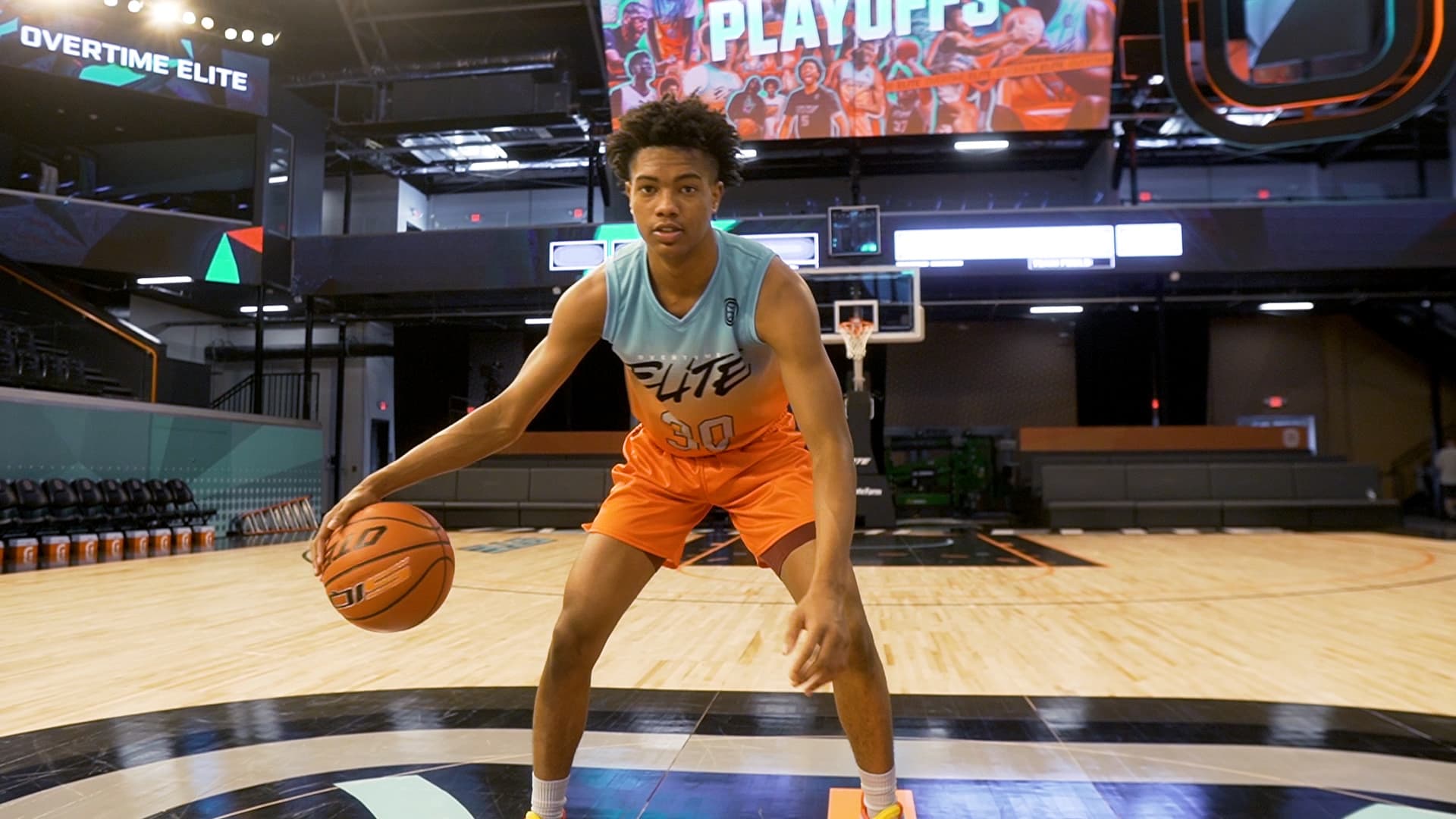
Bryson Warren is probably one of the few teenagers you'll meet whose high school job comes with a guaranteed six-figure income.
Warren, 17, is among the first class of high school athletes to join Overtime Elite, a New York-based company that recruits – and pays – some of the top-ranked high school and teenaged basketball players from around the world to play at its academy in Atlanta.
The athletes at Overtime attend classes and study for a diploma. They compete against each other and other high school basketball teams from across the country. They also offer a base annual salary of at least $100,000 for every student-athlete, with on-court performance bonuses potentially pushing that figure above $1 million.

Get Tri-state area news and weather forecasts to your inbox. Sign up for NBC New York newsletters.
For Warren, who grew up near Little Rock, Arkansas, and was ranked by ESPN as the 14th-best U.S. high school basketball player in his age group, the appeal was obvious. He and the 26 other student-athletes at Overtime jumped at the rare opportunity to earn big money as high school athletes, while they work toward hopefully making an even bigger leap to the NBA.
"Not too many 17-, 18-, 19-year-olds can say they made at least $100K," Warren tells CNBC Make It. "We're just really getting a head start on life, just playing the game we love."
What is Overtime Elite?
Money Report
Founded in 2016 by Dan Porter and Zack Weiner, a pair of alumni from the Hollywood talent agency WMA, Overtime is an experiment in both sports and entertainment.
The league, which kicked off its first competitive season last year, posts player highlights and full-game recaps for Overtime's millions of followers on like Instagram, TikTok and YouTube. According to Overtime, the content it creates featuring teen athletes like Warren is viewed online more than 18 billion times per year.
Overtime has also raised more than $100 million from investors including Jeff Bezos' investment firm, the rapper Drake, a host of NBA stars – including Kevin Durant and Carmelo Anthony – and Silicon Valley venture capital firm Andreessen Horowitz.
The league declined to share revenue information with CNBC Make It, but noted that the company also makes money from streaming content, merchandise sales and sponsors – including State Farm, Gatorade and trading card company Topps.
Aaron Ryan, the company's president and commissioner, and a former NBA marketing executive, says the league reinvests some of that money into its players.
"We cover the cost of food, lodging, transportation and every cost associated with being in the program, first and foremost," he says. "But, also a performance bonus, as well as equity in our company, which is commensurate with what every other employee at Overtime receives."
Ryan says the league also offers each player $100,000 toward college tuition, should they decide not to pursue the sport as a full-time career. The scholarship is purely academic: Overtime players won't be eligible to play college basketball, since their salaries make them "professional" athletes.
That's why Overtime also spent money on a basketball operations team, led by former Sacramento Kings assistant general manager Brandon Williams, that could stack up against most major college programs. The coaching staff is led by former NBA player and University of Connecticut coach Kevin Ollie, and includes former NBA player Ryan Gomes and former University of Virginia coach David Leitao.
Those names help Overtime attract top teen talent from across the world: Overtime's current roster of 27 players includes at least eight athletes who were previously five-star college recruits, according to The Athletic.
Warren was one such recruit. Signing with Overtime meant rebuffing offers from athletic powerhouse programs like Kansas, Maryland, Auburn, Georgetown and Oklahoma.
"Almost every offer you can think of," he says with a smile.
A day in the life of a pro high school athlete
Warren spends most of his time at Overtime's 100,000-square-foot Atlanta facility, which is an all-in-one arena, training facility, dormitory and boarding school.
He gets picked up by an Overtime athletic trainer at 6:15 am nearly every morning to spend about 90 minutes in the gym, before heading to a three-hour basketball practice on the court with his teammates. After lunch, Warren says, the players head into Overtime's classrooms until around 4 p.m.
Overtime's academy is an accredited institution with certified teachers, which allows the student-athletes to earn high school diplomas — rather than GEDs — and begin taking college-level courses. Warren says it's a typical high school curriculum, with "math, English, science or biology with social studies [and] history."
Warren says he especially enjoys a "financial literacy" class, which instructs the student-athletes on the intricacies of signing professional contracts, questions to ask their agent and advisors, and how to practice responsible spending.
"They're teaching us who to have in your circle [of friends and family] and stuff, just keeping your circle small," Warren says. "[Six-time NBA All-Star] Tony Parker came in and talked to us [and] he told us it's not about who you say 'Yes' to, it's who you say 'No' to."
After class, the student-athletes typically either return to the gym or basketball court for some more training, "and then the rest of the day is yours," Warren says.
Chasing his NBA dream
Without Overtime, Warren would currently be finishing his junior year of high school and likely receiving intense recruitment pitches from prominent college basketball programs. But if Warren feels like he's missing out by choosing Overtime over college, he's not letting on.
For now, he says, he's focused on reaching the NBA. His high marks on ranking websites like ESPN suggest he has good shot of getting there. "My goal once the program ends is definitely just to get drafted [in the NBA]," he says. "That's everybody's goal here."
Warren also says he dreams of using his basketball success to positively impact his community. He looks up to LeBron James, he says, for what James has done off the court — including opening a public elementary school in James' hometown of Akron, Ohio, where students have a chance to earn free tuition to the University of Akron.
"Everyone doesn't do that, just him willing to give back and starting a school for free," Warren says.
Warren is already investing some of his Overtime salary in a local co-educational AAU basketball team in his Arkansas hometown, helping support kids from 2nd grade through 6th grade. Still, he says, he couldn't resist at least one splashy purchase with his newfound income — and he'd always dreamed of owning a Dodge Charger.
"That actually came true. So, I was just blessed for that to happen," he says.
Warren says he's aware that taking such a non-traditional path to chase a lifelong dream can be incredibly risky. There's no guarantee that Overtime will give him a better chance of impressing NBA scouts than playing in college or the NBA's developmental G League.
"You could see Overtime as a risk, or you can see it as an opportunity," he says. "This is the opportunity I chose, and it's the one I'm going to live with, and I'm at peace now."
Sign up now: Get smarter about your money and career with our weekly newsletter
Don't miss:
Overtime is starting a basketball league for 16-to-18-year-olds that pays at least $100,000 a year






